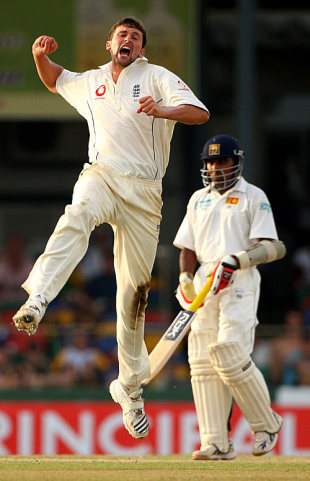England handed reality check
On a day where they took two wickets, England were given a harsh lesson in playing cricket on the subcontinent
Andrew Miller in Colombo
11-Dec-2007
|
|

|
To their huge credit, England never gave up. They pounded in with new
ball and old ball alike, and kept their cool in soaring temperatures
as Mahela Jayawardene renewed his love affair with the SSC wicket.
Three of his four highest scores in Test cricket have all come on this
ground, including today's unbeaten 167, which carried him past 7000
career runs. Nobody in the world knows the nuances of this wicket
quite like he does. England's rookie attack were on a hiding to
nothing from the start.
"Days don't get much tougher than this," said England's coach, Peter
Moores, who has kept a brave face throughout the trip in spite of the
shortcomings of his charges. His first year in the job has been
impressive in many respects, and yet he is already in danger of
relinquishing his second Test series in three attempts. For all the
brickbats that have been thrown Duncan Fletcher's way, he only once
suffered back-to-back series defeats in his seven-year tenure - in
2001-02 when his opponents were Australia at home and India away, each
at the peak of their powers.
And yet, if England maintain their discipline as admirably as they did
in the field today, the teams will reconvene at Galle next week with a
share of the series still up for grabs. "They didn't back off at any
stage," said Moores. "They are disappointed not to have got more
wickets, but they have been buoyant all throughout the day. What you
have to gauge from people is were they giving everything they've got?
If you don't think they are, then it's pretty much a hanging offence,
but if they are, then you've got to respect them for that."
No-one was more likely to arouse the lynch-mob than Steve Harmison,
whose bottle has been questioned on a near-daily basis since his last
foray overseas. But, contrary to the naysayers' expectations, he
epitomised the intent with which England went about their work.
According to Moores, he was not handed the new ball for tactical
reasons - Ryan Sidebottom guarantees swing and Stuart Broad, in his
first game, benefited from the assistance and familiarity of the
harder ball - but he regularly extracted life from the stultifying
surface and his late, splice-rattling, breakthrough was greeted with
genuine glee by bowler and team-mates alike.
"Harmy bowled really well," said Moores. "He bowled good areas and I
think he's really pleased in some ways. He was enjoying himself, he
ran in hard and though he didn't have that spell where he got two
wickets, he looked like it was there." Harmison gave the lanky Michael
Vandort particular problems with his leaping bounce, and though his
figures of 28-8-67-1 are nothing to write home about, the telltale
sign of his rhythm was the extras column. No wides, no no-balls. He
was hunting the crease all day long, arms and legs pumping. With even
a hint of assistance, he could have made it England's day.
| Monty struggled a bit for rhythm early on, which happens. You always want to be in perfect rhythm as a bowler, and as a batsman you always want to time it perfectly, but it doesn't always happen - Peter Moores on Monty Panesar | ||
England's single biggest disappointment was once again Monty Panesar.
To be outbowled by Muttiah Muralitharan can never be classified as a
surprise or a disappointment. To be outbowled by Kevin Pietersen, on
the other hand, is an eyebrow-raising turn of events. KP's exploratory
over before lunch turned into a probing spell of ten off the reel, as
he found all of the turn, bounce and bite that Muralitharan had sworn
did not exist on this track. He was unlucky not to add to his tally of
two Test wickets - the ball that beat Vandort from outside leg stump
was significantly classier than the long-hop that Kamran Akmal
feathered to the keeper at Lord's in 2006.
Panesar, on the other hand, endured a torrid day of lost rhythm and
frustrated appeals. He scarcely threatened until he came over the
wicket to attack the rough from a defensive line, and though he might
take some solace from recalling that Muralitharan took the same number
of overs, 32, before his first breakthrough at Kandy, Murali never
leaked his runs at the rate of three-and-a-half an over.
"Monty struggled a bit for rhythm early on, which happens," said
Moores. "You always want to be in perfect rhythm as a bowler, and as a
batsman you always want to time it perfectly, but it doesn't always
happen. He started finding his timing again later in the day, but
this wicket is tough to bowl people out on, and we've got to accept
that and find ways to get round it."
Moores, by his own admission, can do little to alter the course of
England's destiny in this match. He can offer strategies and
suggestions, but the only thing that will dig the team out of their
current hole is more of the same grit and determination that they
showed in adversity today. "Sri Lanka are a commanding position, and
that's a fact," said Moores. "But we've got to try to bowl them out as
quickly as we can, and then not think about anything other than
batting, to take the game to where we are safe, or even competitive.
Batting last on that wicket will be tough."
Andrew Miller is UK editor of Cricinfo